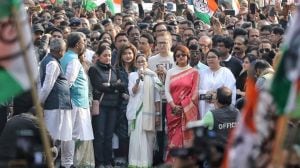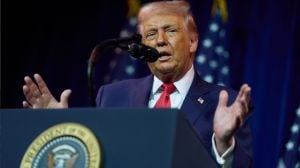Neck and neck, democrats woo superdelegates
Seeing a good possibility that the Democratic presidential nomination will not be settled in the primaries and caucuses...

Seeing a good possibility that the Democratic presidential nomination will not be settled in the primaries and caucuses, Senators Hillary Rodham Clinton and Barack Obama are lavishing attention on a group that might hold the balance of power: elected officials and party leaders who could decide the outcome at the convention in August.
There are 796 of them, and if neither Obama nor Clinton emerges from the primary season with the 2,025 delegates necessary to secure the nomination, they will in essence serve as tiebreakers. That is a result both sides see as increasingly likely.
Known as superdelegates because they are free to cast their votes at the convention as they see fit, they are the object of an intensifying and potentially high-stakes charm offensive by the candidates and their supporters. The Clinton campaign has established a system, overseen by one of the party8217;s most seasoned behind-the-scenes operators, Harold Ickes, to have superdelegates contacted by carefully chosen friends and local supporters, as well as by big-name figures like Madeleine K. Albright, a former secretary of state. For particularly tough sells, the campaign has ex-President Bill Clinton or Chelsea Clinton make the call.
Obama has enlisted Tom Daschle, the popular former Senate majority leader, as well as Governor Janet Napolitano of Arizona and Senator John Kerry of Massachusetts, the party8217;s 2004 presidential nominee. 8220;You know there is something interesting going on when you pick up your cellphone and see all those out-of-state phone numbers,8221; said Representative Gabrielle Giffords of Arizona, who reported getting calls from Napolitano and Daschle.
A survey of the superdelegates by The New York Times that was completed a week ago found that 204 had decided to back Clinton, 99 backed Obama and the rest said they were undecided or did not respond. The survey came before the coast-to-coast contests on Tuesday, and the superdelegates can change their minds at any time.
The superdelegates include all Democratic governors and members of Congress, as well as officials and other prominent members of the party.
Obama, talking to reporters in Seattle on Friday, said he believed superdelegates should follow the will of the voters. 8220;My strong belief is that if we end up with the most states and the most pledged delegates from the most voters in the country, that it would be problematic for the political insiders to overturn the judgment of the voters,8221; Obama said. 8220;I think it is also important for superdelegates to think about who will be in the strongest position to defeat McCain in November.8221;
Clinton disputed Obama8217;s interpretation. 8220;If Senator Obama and his campaign continue to push this position, which is really contrary to what the definition of a superdelegate has historically been, I will look forward to receiving the support of Senator Kennedy and Senator Kerry.8221;
- 01
- 02
- 03
- 04
- 05































